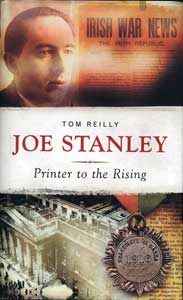20 October 2005 Edition
Books

Printing for the Republic
• Book Review
Joe Stanley — Printer to the Rising
by Tom Reilly, Brandon.
€24.99 (hardback, illustrated).
Many people set the scene for the great drama of Easter Week 1916. Among those who prepared the stage was Joe Stanley — journalist, publisher and printer. He was of that talented generation that made a revolution.
Stanley was full of flair and enthusiasm when he started his printing business in 1913. He was also a committed republican, a member of the IRB and the Irish Volunteers. On the outbreak of the Great War the British Government suppressed nationalist, republican and labour publications, but Joe's Gaelic Press printed a succession of 'mosquito press' papers such as Honesty, The Spark and The Gael. He assisted both James Connolly and Arthur Griffith. At the same time he continued to publish his own GAA journal, The Gaelic Athlete.
A month before the Rising the Gaelic Press was raided and broken up by the British. Some of the type that survived the raid was used to print the Proclamation of the Republic in the basement of Liberty Hall. Joe was attached to the GPO garrison and, under instructions from Pearse and Connolly, commandeered a small printing works in Halston Street where he printed Pearse's bulletins to the citizens of Dublin during Easter Week.
Interned in Frongoch, Joe was a prolific letter writer to his wife, Abbey actress Annie Walker. The letters show his intelligence and dry wit. On the prospects of release before Christmas 1916, he wrote:
"To the fatuous Englishman dining off roast turkey and fortified with a few glasses of brandy, the headlines in the newspaper 'Restored to the Old Home at Xmas Eve' would be infinitely consoling and refreshing as a condiment to a good dinner. Having acquitted himself of this monumental act of magnanimity he would expect Ireland to sit up and take notice of his recruiting posters once more. (Alas if he should be disappointed.)"
Upon release Joe threw himself back into the movement and re-established his printing business. But the Gaelic Press was short-lived as it was repeatedly raided by the British who took particular exception to the republican songs and music he published. They finally destroyed his business altogether. Although a friend of Michael Collins, Joe took no part in the Civil War. His relationship with the new Free State Government soured when they failed to compensate him for loss of his business in the struggle and when they contested the case of a traffic accident in which Joe's sister was badly injured and for which a Free State military lorry was responsible.
This book was possible because Joe Stanley ensured that his personal papers, as well as productions of the Gaelic Press, were preserved. The author has used the material to write an engaging story of the varied life of the republican printer, writer, cinema owner and newspaper proprietor. Other historians no doubt will use the material to flesh out the wider story of the period.
We learn little of Joe's political views later in life. Reilly does tell us that he appointed republican Larry De Lacy as production manger when he revived the Drogheda Argus newspaper in the1940s. De Lacy was a senior (and somewhat controversial) IRA man. A Joe Stanley is listed by Uinseann Mac Eoin in The IRA in the Twilight Years as one of those who put up funds for the purchase of 44 Parnell Square by the Republican Movement in 1925. Is it the same man?
This book makes excellent use of surviving printed material from the Gaelic Press, much of which has not been reproduced before and it maintains the high standard of production by Brandon, something Joe Stanley would surely appreciate.
By Micheál Mac Donncha

New Adams Book
Sinn Féin President Gerry Adams launches a new book The New Ireland, A Vision for the Future‚ on Monday 24 October in Belfast and Dublin.
Sinn Féin recently published Sinn Féin A Century of Struggle‚ looking at the history and development of the party since 1905. The new book also marks Sinn Féin's 100th birthday.
It is not a party political manifesto, more of a personal statement by Adams about the nature of modern Irish republicanism and its vision.
It re-states primary republican objectives -- a united, independent Ireland, an end to partition and to the union with Britain, the construction of a new national democracy in Ireland and reconciliation between orange and green. It seeks to map out the way ahead for Irish republicans in achieving all these goals. Republicans must use growing strength to build an island-wide, a nationwide, mass Sinn Féin movement.
The book examines all of this and looks at the role of Irish republicanism and the nation; the relationship with unionism, the EU and International matters; women; the Irish language; rural Ireland; and more.
Gerry Adams will launch the book in
Belfast on Monday 24 October at 11am in Conway Mill and in Dublin 5.30pm in the Irish Writers' Museum, Parnell Square

Tom Barry in paperback
The paperback edition of Meda Ryan's Tom Barry, Freedom Fighter, which has been at the centre of academic controversy since its release in hardback, was launched at a reception in the Teachers' Club in Dublin on Friday 14 October.
The reception chaired by Niall Meehan was attended by veterans of the International Brigade who fought in the Spanish Civil War in the 1930s including Michael O'Riordan, Jack James Larkin Jones and Jack Edwards from Liverpool, and Bob Doyle.
Ruan O'Donnell, author of Robert Emmet and the Rising of 1803, introduced Ryan's book and referred to the recent controversy around Ryan's book. He said that reason for much of this was that Barry was still viewed by some as a dangerous figure. He slammed the "vituperation" and "calumny" from some quarters which had been directed not only at Tom Barry's memory but at the book's author Meda Ryan herself, which he said was "unpardonable".


